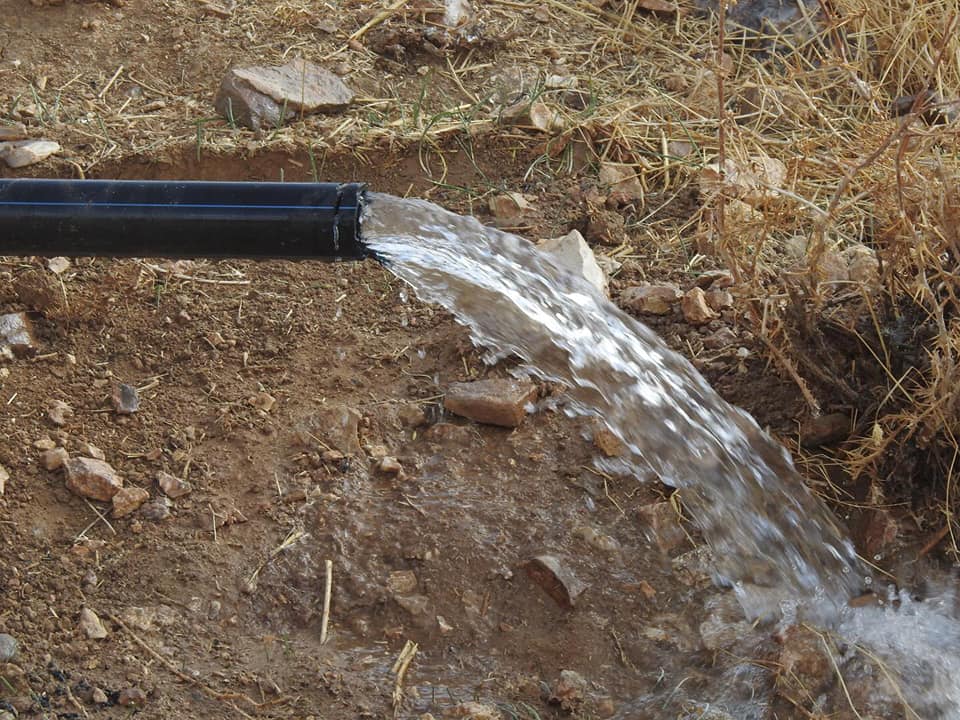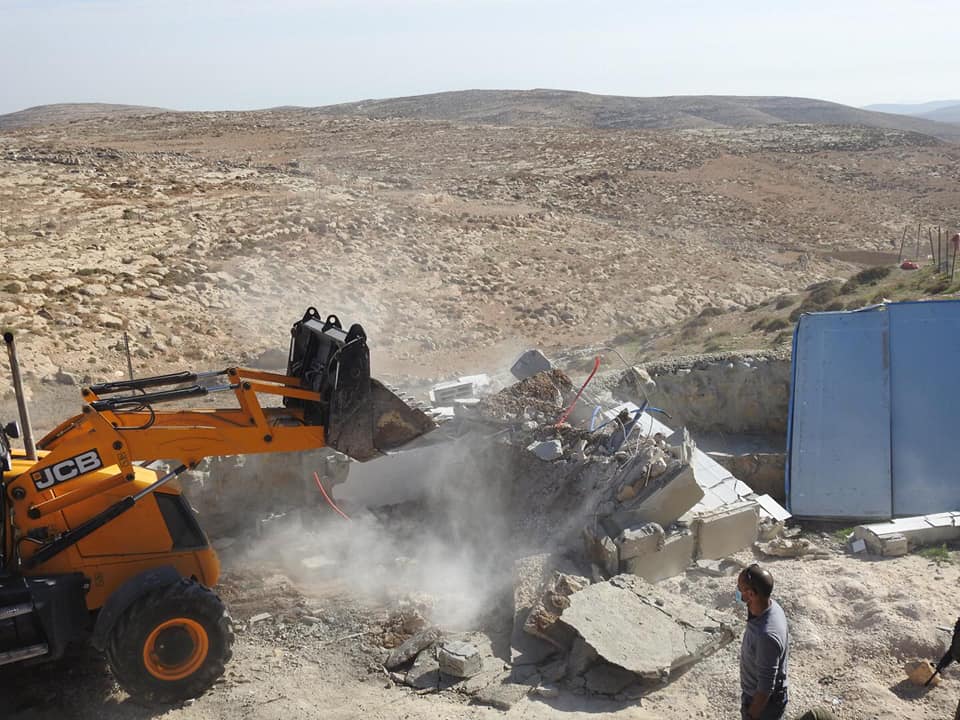For sixteen years I have walked at Nasser’s side. He was 20-years old when we first met. His youthful dream was to become a vet. Luckily that didn’t work out, otherwise – how could he have grown to become the one to document as a researcher of B’Tselem of the everyday injustices incurred in his area, and still manage to remain connected to himself?
Early last week we had our usual “how are you?” phone call. Nasser told me that he had had a week filled with demolitions at various locations within his charge. After a moment’s silence he said: “The most frightening thing about it is to become used to it”. We arrange to meet at his Susya home on Wednesday, at 9 a.m. (hoping there will be no demolitions then), in order to think together about experiencing ongoing injustice and not “getting used to it”.
7:50 a.m. – we’re on our way. A voice message from Nasser arrives: “There are 3 bulldozers near Umm Al-Kheir and I’m on my way there”. Now we already know there will be a demolition today, we just don’t know exactly where. Nerves are on edge – who will be the victim of this Russian Roulette today, the lords-of-the-land’s favorite game. The memory of former demolitions is revived and the area’s villagers are going out of their minds.
The fatal choice fell on Khirbet A-Rakiz – a beautiful village of cave dwellers on a hillside, overlooking a fertile valley. The villagers labor there ever since the Israeli army cut the irrigation pipes that reached it from A-Tawani village.
We arrive. We are already really close. All I want is to run to the people, to the dazed women and children, and hug them. Tell them that we’re with them, that we won’t let anyone tear them away from their land… But two soldiers, covered from head to foot in all sorts of shields, do not allow Ehud, Yair and myself to approach.
I said something to the young soldier who ordered me to stop. Trying to control myself, I don’t remember the exact words but I do recall his answer: “It’s not my decision. I only follow orders.” These words sound familiar. When I hear them, the blood freezes in my veins. There are certain things that Jews are not allowed to utter.
At close range we see how the monstrous bulldozers - that have a driver who only follows orders, and commanders and subordinates in and out of uniform (Civil Administration) who only follow orders – shatter lives. I want to throw up, but there is no time for trivia.
The demolition ends rape-style – finish and leave. I run the slope to the people, the women and children who yelled and then cried, and then their hands dropped, and now they sit still and silent.
We are met by Muhammad Muhammad. We don’t know him. His blue eyes are blazing in anger and he says to us in Hebrew: “You are another peace organization that does nothing but talk. You don’t do anything. Can’t you influence your government?” We keep silent. Try not to take it personally. Muhammad keeps taking his anger out on us. So much pain comes out. When things quiet down a bit, I asked Muhammad if he can influence his government. He says they cannot, but that in our case things are different. “They’re no longer different” I said, and my breathing contracted a bit more.
Then he looked at us softly. He invited us to his home (a house not yet demolished) and showed us from where people had broken in, probably from one of the settler-colonist outposts nearby (Havat Ma’on, Avigail), into his home last Saturday, where they stole the generator and other pieces of equipment. Muhammad’s cousin, also named Muhammad, insisted on inviting us for coffee.
We sat at the entrance to the cave where he was born in 1967. The thieves broke in there too, and stole the battery of the solar panels. And now this demolition. I asked Muhammad Muhammad what he does with all that pain. “I cannot afford to bring up my children on hatred. So I swallow it all and get sick.”
The whole while the demolition forces kept on demolishing more houses in nearby Khirbet Sarura, then on to Khalat A-Dhaba where they demolished Jaber’s home again. They demolish and he rebuilds, and again they demolish and he rebuilds. What does he do with the pain?
We couldn’t approach so we continued to Fakhit on the main Massafer Yatta road. The demolition convoy gets close to us – 3 Civil Administration Toyotas, 2 army jeeps and 3 bulldozers. The first Toyota stops us. “This is a firing zone. Where do you think you’re going?” Ilan spits at us, head of the regional Civil Administration. Had his face not been so full of himself and of hatred, he could be considered handsome. “We’re on a trip to Arad” (an Israeli Negev town) Ehud answers, and we seem to have somehow gotten away with it. We were wrong. An hour later, on our way back from Fakhit on the same road, we meet the demolition convoy again.
I am not sure I have words to describe what my eyes saw and my heart felt in those moments.
Now, as I write this, I recall the motto that the poet Rosario Castellanos, Mexico’s ambassador to Israel in the early 1970s, wrote in her book Balún-Canán: “We shall whisper the origin. We shall whisper the story and the tale… We have fulfilled our task, and our days are done. Think of us, blot us not from your memory, consign us not to oblivion”.
They had cut the water pipes with a handsaw. The bulldozer pulls the pipe to the middle of the track, and the cutters cut away. With their own hands, they cut the life pipes of hundreds of people living in Massafer Yatta in their miserable little villages. Cutting away, and the water pours down on the track’s hard ground and will reach no one, no person, no animal, no bit of soil.
The Palestinian activists of the area are already there. We wish to join them. There are Nasser and Tareq and ‘Eid, our dear friends. Ehud parks the car at some distance, and Yair and I walk over to them. I hug Tareq and Nasser. Nasser calms me and himself and whispers into my ear: “Don’t worry, we’ll appeal to the Supreme Court. We will win eventually.” That very moment, the officer is roaring into my other ear: “Whose is the red Subaru? (He knows, we’ve already met today). If you don’t scram immediately, I’m confiscating your vehicle”. My eyes stared at the jets of water streaming out of the cut pipes, at how they irrigate the tight dirt track in this arid desert area whose annual rainfall is minimal. The officer’s threats found no place in my heart.
For a long while the cutters persisted. I felt as though my own veins were being cut. I was going out of my mind. From the abyss I recalled that earlier this morning we were on out way to Nasser, to wonder together how to experience the crisis and not letting it break you. How one experiences time and again this helplessness, and does not get used to the sights. How one meets the jets of hatred and indifference and manages not to hate in return.
At evening time, I returned to my Negev home, which the regime’s officials do not demolish and where water pipes are not cut.
Separately I wrote to Tareq, to Nasser and to Eid:
“Hi my very dear friend, it has been a difficult day. For you, for me. At A-Rakiz, and at Khalat A-Dhaba I felt as though my own home was being demolished, and when the water pipes were cut I felt as though my very veins were being severed. Your persistent presence amazes me every time anew, how you manage to keep your mental stability.
Love, Erella”
Tareq answered me:
“Good evening, Erella, thank you. Thank you very much. This is the hard part of our lives, the fact that it has become routine. What can we do? We shall go on struggling, videoing, documenting, distributing it all to the world at large, so that one day with support of people like you, who know what integrity is, we shall manage to live a life of peace and quiet. Thank you for your presence there, and for the words you wrote me. It strengthens me and protects me. Thank you.”
Next week we shall come again, as we do every week, to practice keeping stability in hellish conditions…
Erella
On behalf of The Villages Group
Photos: Alliance for Human Rights



